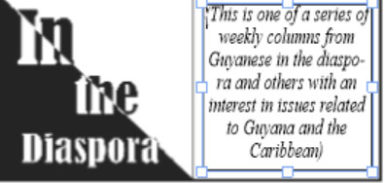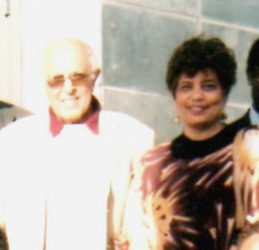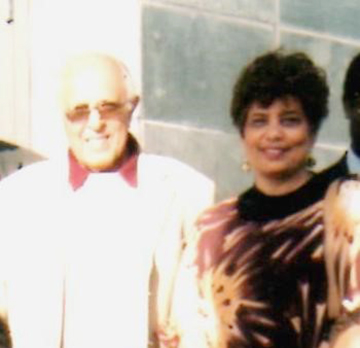Nesha Haniff, Guyanese, is on the faculty of the University of Michigan and director of the Pedagogy of Action which is now piloting a methodology for gender consciousness for girls in Jamaica and US communities of colour, called the Gender Consciousness Project.
When Madiba died in 2013, “Kathy” (Ahmed Kathrada) felt as though he had lost a part of his being. Winnie Mandela in her comments on the death of Ahmed Kathrada said: I’m experiencing the same pain I was experiencing at the death of Madiba [ex-husband Nelson Mandela].
When Madiba passed on, part of his soul was left in Kathy, he was just an extension of our family. So, the pain is the same, and somehow it feels like a closure of a chapter in history.
The passing of Mr. Ahmed Kathrada on March 28th 2017 has generated angst in South Africa for he lived in the principles of the Rivonia 8 who were sentenced to life for their resistance to apartheid.
“The death of Ahmed Kathrada emphasizes that a golden generation of anti-apartheid heroes has nearly gone. Along with the likes of Nelson Mandela, Oliver Tambo and Walter Sisulu, he was part of a group untainted by corruption, acting as a moral compass for the nation. His generation literally gave up most of their adult lives to fight to liberate black people from the yoke of white minority rule. “Uncle Kathy” stayed relevant to the struggle of the downtrodden till the end. He was critical of the current administration, asking President Zuma to resign following a damning court judgment against the president. His significance in the anti-apartheid struggle was also to deracialise it.
He proved that the fight was not just left for black Africans to wage on their own, and that is how I will remember him” (Milton Nkosi, BBC News Johannesburg)
 In his last act, Ahmed Kathrada instructed that his coffin be swathed in the flag of the ANC and as you looked at this flag draped over his lost life he reminded the ANC and the nation that the veterans of the ANC who fought and died for their country, Madiba, Walter Sisulu, Oliver Tambo and Ahmed Kathrada lived as examples for the people of South Africa – untainted by corruption. The practice of the people’s liberation in South Africa today hovers on an increasingly precarious precipice now that the veterans of the struggle are gone. Only two are left. Dennis Goldberg and Andrew Mlangeni.
In his last act, Ahmed Kathrada instructed that his coffin be swathed in the flag of the ANC and as you looked at this flag draped over his lost life he reminded the ANC and the nation that the veterans of the ANC who fought and died for their country, Madiba, Walter Sisulu, Oliver Tambo and Ahmed Kathrada lived as examples for the people of South Africa – untainted by corruption. The practice of the people’s liberation in South Africa today hovers on an increasingly precarious precipice now that the veterans of the struggle are gone. Only two are left. Dennis Goldberg and Andrew Mlangeni.
Ahmed Mohamed Kathrada was born August 21, 1929 in Schweizer-Reneke, South Africa, and died on March 28, 2017.He was 60 years old when he left Robben Island in 1990, having spent 26 years in prison and then living out of prison for 27 more years, barely a year longer than his time in prison. Schweitzer- Reneke was suffocating and in his books and in conversation he remembers in great detail all the acts of oppression his family suffered. He joined the Communist Youth league when he was 12 years old and then later the Indian National Congress and the ANC.
What is important to know about him is that he felt that the organization must be bigger than its leader. He waged important theoretical and ideological struggles – the shift from the ANC being a Black only party to a non-racial one, the continued existence of the communist party, even in times when there was great pressure for him to disavow the party and to deny his communist roots. Indeed the communist party exists in South Africa today because of Kathy’s support. In his final years, his calling on President Jacob Zuma to resign and his unflagging support for the Palestinian cause continued his lifelong struggle against injustice. In 2008 the Ahmed Kathrada Foundation was established to advocate for a nonracial and non sexist South Africa.
His calls for non racialism are now more urgent as South Africa is now even more at risk of racial implosion since his and Madiba’s death. My home country Guyana has gone down that road and is in desperate need of a champion of Kathy’s nonracialism.
Having been friends since 2000, Kathy and I discussed many things, one being the early and unwavering support of the Caribbean in the anti-apartheid struggle and their love for West Indian cricket. The South African teams were all white and all people of colour were excluded from participation. They knew everyone’s name, Walcott, Sobers, Kanhai, Hall, all of them – listened on the radio when they finally had them in Robben Island and they followed the team in any print they could get. They (he and Madiba, Sisulu and the others) were very knowledgeable about West Indian politics. He wanted to come to the Caribbean which I would have arranged but alas this was not to be.
In 2014, the Kathrada foundation asked me to write a piece about Kathy and our trips to Robben Island. I include it here with a couple of the students’ response to meeting him.
The Pedagogy of Action
For the last fourteen years I have taken students to South Africa from the University of Michigan on a programme called the Pedagogy of Action. This is a programme which is based on an oral methodology I developed to teach low literate populations HIV prevention. In their preparation for South Africa the students must study the culture, politics and history of South Africa.
In 2000 we were at what is now called the Nelson Mandela gateway to catch the ferry to Robben Island and we could not go because the sea was too rough and so when I finished talking to the ticket agent, he pointed to the gentleman who was just walking away and he said to me, do you know who that gentleman is and I said no. He said have you ever heard of Mr. Kathrada. I said YES! And he said there he is. I dropped my handbag and ran after him, shouting Mr. Kathrada! Mr. Kathrada! Mr. Kathrada! He turned around and spoke to me while I babbled. He behaved as though he was ordinary when he was so extraordinary.
Since that time we became fast friends. He came to Michigan a few times and we have seen him consistently in South Africa over the past fourteen years. Because I know we are going to meet him I spend a great deal of time making sure my students know about the history and struggle in South Africa and that they know him. In their dispatches about their travels home, the students write about the meaning of meeting him I think all of us who have met Kathy and have experienced his Robben Island, try, like the students, to find the words to adequately describe him – a description that has always eluded me.
In his very beautiful and moving book, No Bread for Mandela, Kathy talks about his love and admiration for Walter Sisulu, as his mentor, his father. He uses a tribute written by the great Ruth First to give us a feeling of this seminal South African:
“And in his person he is committed to the practice of liberation because he is committed to the liberation of his people, our people, but he is a liberated man himself. He uses no devices to overwhelm others. He has pride, but no false pride. He has no arrogance, he has no malice. He is a plain and straight forward man, he is a soft spoken man, but he is a committed man, a man who makes no concession when questions of principle are at stake.”
This too is Kathy and I am sure Kathy will demur at such comparisons, but the line “he uses no devices to overwhelm others” is the line we have been looking for to describe one Mr. Ahmed Kathrada.
Here are some testimonies from a few students who visited South Africa and met Ahmed Kathrada.
Live History
We have all had the opportunity to visit museums. The routine of walking around, casually reading scattered facts, and continuing with our day is how it always goes. On Monday, we found a way to break that routine. There we were—a group of twenty Americans—following Mr. Ahmed Kathrada through the halls of Liliesleaf Farm. We were in disbelief as we followed him from room to room, listening to him explain how he and his colleagues, such as Madiba, used the farm to hide and create their political strategy. There was an eerie feeling when we arrived in the room in which he was arrested. He nonchalantly talked about the danger he was in, and the tough prison conditions he faced over his twenty-six years of imprisonment.
Looking around and seeing pictures of a young Mr. Kathrada, and then looking back at him explaining his journey, gave way to many emotions. There was a chilling feeling when I realized that I was following a live piece of history through a museum. His pictures and the pamphlets came to life as he described every detail as if it were his first time there.
Sami Shalabi, 2015
If I had to pick one moment in ZA when I felt transformed, it was meeting Mr. Ahmed Kathrada. For the first time in my life, I felt proud to be of Indian descent as I saw it connected me to a man who had put his life on the line to end apartheid and fight for the humanity of black lives.
A man who refused to accept the slight advantages he was given over his black peers, instead challenging the ways in which the oppressors tried to pit people of color and black people against each other during apartheid ZA. A man who understood that his liberation was tied with his black siblings.
Through his struggle and triumph, through his courage and conviction, I saw my own path for justice carved out as a brown woman in the US. As I reflect on his life, his humility, his character, I hope to fight for the liberation of all, just as he did. Thank you, Uncle Kathy.
Harleen Kaur, University of Michigan Bonderman Fellow










